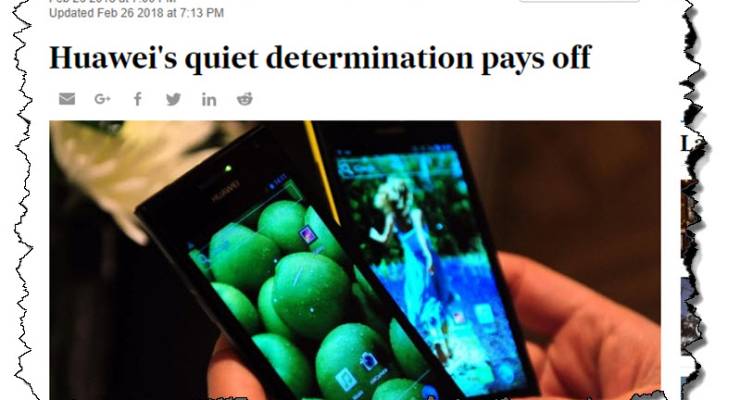
Chinese ICT manufacturer Huawei has certainly got its money’s worth from the Financial Review this week. After flying Jennifer Hewett to Barcelona for the Mobile World Congress, Hewett has produced two glowing pieces for the company, “Huawei’s quiet determination pays off” and an “exclusive” interview with CEO Ken Hu.
Both pieces — which disclosed that Hewett had traveled courtesy of Huawei — peddled the trademark Huawei aggrieved tone that we’ve heard so often from the company in previous charm offensives: that western countries like the US and Australia have banned its wonderful products over unfounded fears they will provide the Chinese dictatorship with ready access to telecommunications across the world. Hu complained of “groundless suspicions” about Huawei’s links with the People’s Liberation Army and the Chinese government.
Huawei’s local representative, John Lord, offered a similar line to Hewett, telling readers:
Huawei strongly and consistently rejects US allegations, insisting it poses no greater cyber security risk than any ICT vendor sharing global supply chains. Australian board members include former Victorian Premier John Brumby, and its chairman is John Lord, a former Australian navy rear admiral. Such directors can hardly be classed as Chinese “agents of influence” — even under the government’s radical new rules designed to limit foreign involvement in Australian politics.
Problem is, Huawei’s links to the Chinese government are a matter of public record. A long House of Representatives Intelligence Committee report in 2012 detailed a wide range of concerns about its connections with the Chinese state and its security apparatus, as well as Huawei’s failure to be forthcoming with such information. Labor banned Huawei from providing equipment for the NBN, and the Abbott government upheld that ban. The Defence Department here has also banned Huawei phones and is phasing out phones made by another Chinese company about which there have long been concerns, ZTE. Privately, senior officials are scathing about what they see as the security risks of Chinese telecommunications companies. The Indian government have had similar concerns in the past.
Little of this made it into Hewett’s copy — merely Huawei’s eternal outrage that it isn’t being allowed to sell its products in western markets.








Direct you to an article in the Economist about the growth of the Chinese Tech industry, and a stroll around commercial Shanghai will reinforce ” in e-commerce and mobile payments, its industry is now bigger than America’s. “. In the emerging world of IOT, connectivity and collaboration is key , so those who thrive set global standards and cement themselves at the centre of every discussion ( see Microsoft in the 1990s ). To quote ” One scenario is that national-security worries mean China’s and America’s tech markets end up being largely closed to each other, leaving everywhere else as a fiercely contested space. This is how the telecoms-equipment industry works, with Huawei imperious around the world but stymied in America.” This will be a defining battle, as we just start to grapple with the consequences of the connectivity explosion in the last 10 years.
Not to worry, Turnbull’s NBN should protect us from the future.
Thank thee Lord “..no greater cyber security risk than any ICT vendor sharing global supply chains.., that is such a relief.
I’m completely reassured.